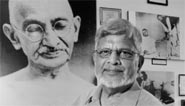Why
is Peace So Elusive?
by Arun Gandhi, President, M. K. Gandhi Institute for Nonviolence

Often when this question is directed to me the image that
pops up in my mind is that of a fireman attempting to put
out a conflagration with a water-hose in one hand and a gasoline-hose
in the other and wonders why the fire continues to rage.
Similarly, we work for peace while feeding the culture of
violence that dominates human relationships and wonder why
peace is elusive. Indeed violence pervades every aspect of
our lives, from justice, economics, education, religion,
and culture to our relationships with each other, with our
parents, siblings, children, and spouses.
I recall the story of my grandfather, M. K. Gandhi, when,
as a 24-year-old struggling lawyer, he landed in racist South
Africa totally unaware of the depth of racial hatred that
existed. On several occasions during his 22-year stay he
was mercilessly beaten by white South Africans, but each
time the police invited him to file charges against his assailants
he refused. His argument was: “Punishing will not teach
them anything, whereas forgiving may open a door in their
heart for some love and understanding to pour out.” And,
it worked! Several of his assailants joined his struggle
and became his followers.
Gandhi was convinced the only way out of the culture of
violence that manifests itself in all human beings in the
form of
hate, prejudice, anger, frustration, jealousies, and so many
other negative attributes is to change this culture to that
of nonviolence. Violence breeds negativity, while nonviolence
succeeds only when one is imbued with love, respect, understanding,
appreciation, acceptance, and other positive attributes.
Peace is not the absence of war and violence; it is the absence
of exploitation, discrimination, oppression, and aggression.
Hence, he concluded: “We must become the change we
wish to see in the world.”
As I grew up in his shadow, he always impressed upon me
the importance of self-examination. “You must always remember,” he
would say, “that you don’t live in isolation.
All our actions have corresponding reactions and impact society
positively or negatively.”
He started ashram communities where people learned to live
in peace and harmony with each other and with nature. Life
was simple, and everything that had to be done was done as
a community. Cooking, cleaning, sleeping, eating, and all
other chores were commonly done by all. Gandhi expanded the
concept of family from the nuclear to include all of creation.
Gandhi was a regular, ordinary child born into a regular,
ordinary family. Up to the time he went to South Africa and
became a victim of prejudice and hate he had paid no attention
to either violence or nonviolence. The only incident that
left a lasting impression on him was something that happened
at the age of 13. Following the practice of the time, he
was married at that age to a 13-year-old girl who had never
been to school but was well-tutored at home.
Gandhi was naïve about this relationship, and so he
visited the local library to read books on married life which,
obviously, were written by male chauvinists because they
all advised that the man must lay down the rules and enforce
them strictly.
That evening Gandhi came home and told his wife, “You
will not stir out of this house without my permission. That
is an order and you will obey it diligently. I want no arguments.” Amused
by this show of arrogance, my grandmother went to bed without
a word of protest. Several days later Gandhi realized that
she was not obeying his order and that she was still going
out without his permission. That night he confronted her
again. “How dare you disobey my order,” he demanded.
Very cool and collected, Grandmother said: “I was taught
by my parents that we must always obey the elders in the
house. I believe the elders in this house are your parents.
Are you suggesting that I do not obey your mother but obey
you instead? Do you want me to go tell your mother that I
will not obey her any more?”
Gandhi was speechless. Of course, he could not tell his wife
to disobey his mother, and so the matter was settled without
a fight. Later, he conceded this was the most powerful lesson
in nonviolent conflict resolution that he learned. If anything,
it brought home to him the importance of anger in perpetuating
the culture of violence.
His life was impacted by little everyday experiences—the
kind that we often ignore. Life must not be a mundane, day-to-day
existence. It must be more meaningful and enlightening, not
just in the material sense, but more important, in the spiritual
and ethical sense. Can we leave this world a little better
than we found it? Is this possible? Of course, that is why
we have organized the Gandhian Nonviolence Conference on
October 14 and 15 in Memphis, Tennessee. We will have workshops
and lectures by eminent people who have transformed their
lives and brought into them more substance and meaning. For
more information on the conference and on the institute visit
www.gandhiinstitute.org/2005conference.cfm.
Arun Gandhi, grandson of Mahatma Gandhi, founded the Gandhi
Institute in 1991. Gandhi started the Institute to teach
individuals about conflict prevention, anger management,
diversity training, and relationship- and community-building.
For the past five years, Gandhi has travelled with the Renaissance
Weekend Deliberators to share his message of peace. See the
above paragraph for the institute website or call (901) 452-2824.
|
